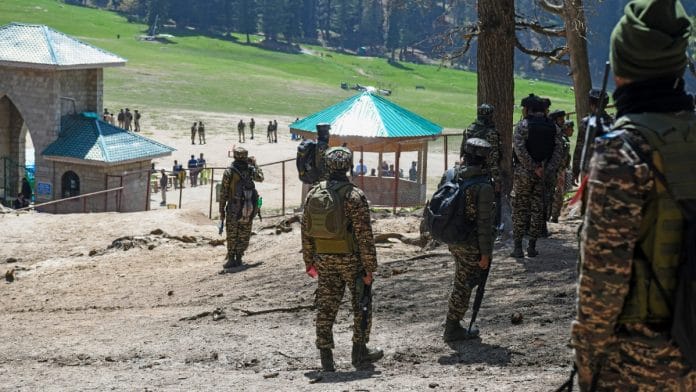New Delhi: The Financial Action Task Force (FATF) in a statement Monday “condemned” the “brutal terrorist attack” in Jammu and Kashmir’s Pahalgam, highlighting that such attacks could not have occurred without “money and the means” to “move funds between terrorist supporters”.
“Terrorist attacks kill, maim and inspire fear around the world. The FATF notes with grave concern and condemns the brutal terrorist attack in Pahalgam on 22 April 2025. This, and other recent attacks, could not occur without money and the means to move funds between terrorist supporters,” the FATF statement said.
The statement added: “In addition to setting out the framework for combating terrorist financing, the FATF has enhanced its focus on the effectiveness of measures countries have put in place. That is how, through our mutual evaluations, we have identified gaps that need to be addressed.”
The statement by the FATF comes amidst the backdrop of India’s renewed push to have Pakistan re-included in its grey list—an identification by the task force that would subject the country to increased monitoring for its support towards money laundering and terror financing.
Pakistan was included in 2018 as a jurisdiction under increased monitoring and removed during a review by the task force in October 2022. This was not the first time it was a part of the grey list, with its inclusion at different times including in 2008 and 2012.
“The FATF welcomes Pakistan’s significant progress in improving its AML/CFT regime. Pakistan has strengthened the effectiveness of its AML/CFT regime and addressed technical deficiencies to meet the commitments of its action plans regarding strategic deficiencies that the FATF identified in June 2018 and June 2021, the latter of which was completed in advance of the deadlines, encompassing 34 action items in total. Pakistan is therefore no longer subject to the FATF’s increased monitoring process,” the FATF had said in its statement on 22 October, 2022, when removing Pakistan from its grey list.
India has publicly held that the Pahalgam terrorist attack, which left 26 people dead, emanated from across the border in Pakistan. As a result of the terrorist attack, on 7 May, India launched Operation Sindoor, targeting nine terrorist complexes in Pakistan including the headquarters of the Jaish-e-Mohammed (JeM) and Lashkar-e-Taiba (LeT) in Bahawalpur and Muridke, respectively.
This led to an escalation between the two militaries, until a bilateral understanding was reached on 10 May to cease all firing across the tri-services. As a part of its diplomatic push, India has been arguing for the re-inclusion of Pakistan into the FATF grey list. New Delhi also pushed its case at the United Nations 1267 Committee to sanction The Resistance Front (TRF), an LeT front, as a terrorist organisation last month.
The FATF is an international standard-setting organisation on anti-money laundering and counter terrorist financing (AML/CFT) standards. One of its key objectives is to identify jurisdictions with significant weaknesses that would allow criminals to circumvent its AML/CFT controls, to launder money or provide financing for terrorists.
The naming of countries in its lists is meant to put pressure on the governments to act to strengthen their AML/CFT regimes. Appearing on the grey list, or even the black list, could lead to consequences for the jurisdiction’s financial system including raising debt or attracting inward investment.
The black list of the FATF, which includes Iran, Myanmar and the Democratic People’s Republic of Korea (North Korea), signifies three jurisdictions, which have extreme deficiencies in their tools to counter money laundering and terrorist financing.
With Pakistan being removed from the list in October 2022, it essentially showcased that the country has been taking the steps as mandated by the FATF to strengthen its AML/CFT regimes.
The FATF issues two public statements at the end of each of its plenary meetings in February, June and October.
(Edited by Amrtansh Arora)






